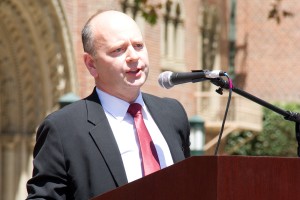USC holds Armenian genocide awareness event
In commemoration of the 99th anniversary of the Armenian genocide, USC’s Armenian Students’ Association and the Shoah Foundation hosted the Armenian Genocide Awareness Talk at Tommy Trojan on Thursday.

Remembrance · Stephen Smith, the executive director of the Shoah Foundation, served as one of the guest speakers at the Armenian Genocide Awareness Talk, which was held Thursday at Tommy Trojan. – Austin Vogel | Daily Trojan
According to the Armenian National Institute, the genocide officially began on April 24, 1915, when over 200 Armenian community leaders were apprehended and later executed in Turkey during the reign of the Ottoman Empire. Over the next eight years, approximately one and a half million Armenians were killed. The political party in power in Turkey during this time, commonly referred to as the Young Turks, carried out the killings.
The event included two guest speakers — Executive Director of the Shoah Foundation Stephen Smith and criminal defense attorney RJ Manuelian — and music including the bands VIZA, Armenian Public Radio and R-Mean, as well as art installations and food displays. The gathering served as a moment to remember those who were killed in the genocide and reflect on the genocide as a whole.
Smith spoke about the world’s reluctance to acknowledge the Armenian genocide.
“The world has been in denial,” Smith said. “We owe those who have fallen recognition, not only by the U.S. but by the world.”
He continued to speak directly to the students in the audience about how they must carry on the torch.
“The obligation is now passed on to the diaspora of Armenians to remember the genocide,” he said. “The obligation is now passed on to all of you.”
Haig Aintablian, president of the Armenian Students’ Association, spoke about his personal experience with the genocide, in which some of his family were victims.
“My [great-grandmother] was personally in the Armenian Genocide,” Aintablian said. “I heard stories of it from my grandma, very very horrific stories. I didn’t realize it was something that would affect me until I joined the board of the USC ASA.”
Aintablian continued to speak about how awareness of the genocide is highly limited.
“Historically it’s so sad not to see it widespread and people don’t know about it,” Aintablian said. “The main thing is for USC students to know about what happened. We’re all going to be the next generation of politicians, the next generation to impact the United States. It’s important that we ourselves are knowledgeable on these important events, especially things like genocide.”
Those in attendance found the event to be an important medium for increasing awareness.
“This is the largest turnout I’ve ever seen,” said Silva Sevlian, a USC alumna and now full-time employee of the Shoah Foundation. “There is actually a substantial Armenian population here at USC. It’s really an important event for them and the community as a whole.”
Mariam Mosinyan, a junior majoring in communication, stressed the need to be privy to the past and present.
“It’s part of my heritage and my history — it’s important to be aware of what’s going on in the community and contribute in any way,” Mosinyan said. “If me being here and bringing a couple of my friends who aren’t Armenian to learn about the issue helps in any way, then that’s what I am going to do.”
Manuelian, the final speaker, discussed USC’s involvement in the remembrance of the genocide as an important responsibility.
“This is a place of learning, where denial cannot take place,” Manuelian said. “Today we are here to remember … Remembrance is the first act of knowledge and knowledge is the first act of ensuring that the denial does not continue.”

